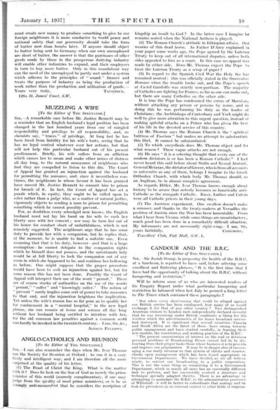MUZZLING A WIFE
[To the Editor of THE SPECTATOR.] SIR,—A remarkable case before Mr. Justice Bennett may be a reminder that an English husband's legal position has been changed in the last hundred years from one of mingled responsibility and privilege to all responsibility, and, as chemists say, " traces " of privilege. At long last he has been freed from liability for his wife's torts, seeing that he has no legal control whatever over her actions, but that will not help this particular husband out of his present predicament. Briefly, his wife suffers from an affliction which causes her to moan and make other noises of distress all day long, to the natural annoyance of neighbours who find they are compelled to listen to this din. The Court of Appeal has granted an. injunction against the husband for permitting the nuisance, and, since it nevertheless con- tinues, the neighbours in whose favour it has been granted have moved Mr. Justice Bennett to commit him to prison for breach of it. In fact, the Court of Appeal has set a puzzle which, in equity, they ought to be called upon to solve rather than a judge who, as a matter of natural justice, vigorouslY.objects to sending a man to prison for permitting something which he cannot possibly prevent.
For, as doubtless every schoolgirl now knows, the English husband must not lay his hand on his wife to curb her liberty save with her consent ; nor may he turn her out of his house for conduct short of unfaithfulnesS, which is not reinotely suggested: The neighbours urge that he has some duty 'to provide her with a companion, but he replies that, at thC moment, he is unable to find a suitable one. Even assuming that that is his duty, however—and that is a large assumption—he cannot delegate to 'the companion rights which he himself does not possess, and the unfortunate lady would be at full liberty to lock the companion out of any room in which she happened to be, and continue her bellowing as before. One might suppose that the proper procedure would have been to seek an injunction agaiiist her, but for some reason this has not been done. Possibly the Court of Appeal will interpret their use of the word " permit." There are of course statics of authorities on the use of the words "permit," " suffer" and " knowingly suffer." The notion of " prevent " surely implies some sort of power to take measures to that end, and the injunction heightens the implication. Yet unless the wife's reason has so far gone as to qualify her for confinement in a " mental hospital," in the new legal Phrase, she can remain at home and scream all day long without her husband being entitled to interfere with her, for the old common law penalties against a common scold can hardly be invoked in the twentieth century.—I am, Sir, &c.,
ALFRED' FELLOWS.






































 Previous page
Previous page